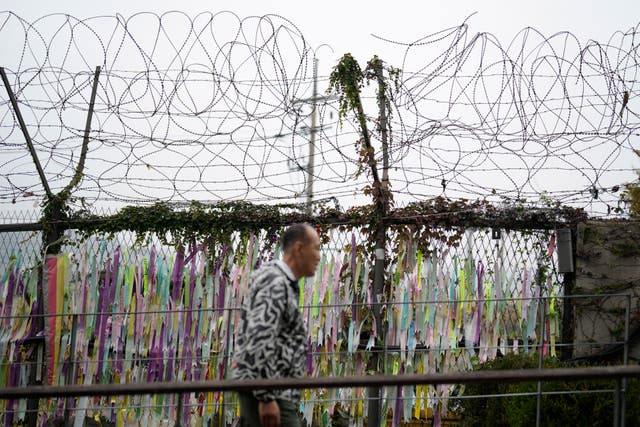North Korea confirms South Korea now defined as ‘hostile state’
The change in the constitution was confirmed after a meeting of the Supreme People’s Assembly.

North Korea has confirmed the country’s revised constitution defines South Korea as “a hostile state” for the first time.
Thursday’s confirmation comes two days after North Korea blew up front-line road and rail links that once connected the country with the South.
North Korea’s rubber-stamp parliament met for two days last week to rewrite the constitution, but state media did not provide many details about the session.
Leader Kim Jong Un had called for the constitutional change at that parliamentary meeting to designate South Korea as the country’s main enemy, remove the goal of a peaceful Korean unification and define the North’s sovereign, territorial sphere.

The official Korean Central News Agency (KCNA) said its recent demolition of parts of the northern sections of the inter-Korean road and rail links was “an inevitable and legitimate measure taken in keeping with the requirement of the DPRK constitution which clearly defines the ROK as a hostile state.”
The Democratic People’s Republic of Korea (DPRK) is the North’s official name, while the Republic of Korea (ROK) is the South’s formal name.
South Korea’s Unification Ministry condemned North Korea’s constitutional reference to South Korea as a hostile state, calling it “an anti-unification, anti-national act”.
It said the South Korean government would sternly respond to any provocations by North Korea and unwaveringly push for a peaceful Korean unification based on the basic principle of freedom and democracy.
Thursday’s KCNA dispatch gave no further details of the new constitution, except the description of South Korea.
“There may still be an internal propaganda review under way about the appropriate way to disclose the constitutional revisions, but this confirmation was expected,” Ankit Panda, an expert with the Carnegie Endowment for International Peace, said.
Mr Kim’s order in January to rewrite the constitution caught many foreign experts by surprise because it was seen as eliminating the idea of shared statehood between the war-divided Koreas and breaking away with his predecessors’ long-cherished dreams of peacefully achieving a unified Korea on the North’s terms.
In the past months, North Korea has torn down monuments symbolising rapprochement with South Korea and abolished state agencies handling inter-Korean relations.
Some experts say Mr Kim is probably aiming to guard against South Korean cultural influence and bolster his family’s dynastic rule, while others say he wants legal room to use his nuclear weapons against South Korea by making it a foreign enemy state, not a partner for potential unification which shares a sense of national homogeneity.
Mr Kim may also want to seek direct dealings with the US in future diplomacy on its nuclear programme, not via South Korea.
“North Korea has fallen so far behind the South that any social exchange or financial integration might look like paths to unification by absorption,” Leif-Eric Easley, professor of international studies at Ewha Womans University in Seoul, said.

“Pyongyang’s rejection of peaceful Korean unification is thus a strategy for regime survival and maintaining domestic control. This not only bodes ill for diplomacy but could also become an ideology motivating military aggression against Seoul,” Prof Easley said.
KCNA, citing North Korea’s Defence Ministry, reported that North Korea blew up the 60-metre-long sections of two pairs of roads and railway routes — one pair on the western portion of the inter-Korean border and the other on the eastern side of the border.
Largely built with South Korean money, the road and rail links were a symbol of now-dormant inter-Korean reconciliation movements.
In the 2000s, the two Koreas reconnected the road and rail routes for the first time since the end of the 1950-53 Korean War, but their operations were halted later as the rivals bickered over North Korea’s nuclear ambitions and other issues.
Last week, North Korea said it would permanently block its border with South Korea and build frontline defence structures. South Korean officials said North Korea had been adding anti-tank barriers and laying mines along the border since earlier this year.
Animosities between the neighbours increased in recent days with North Korea accusing South Korea of flying drones over its capital Pyongyang three times this month and vowing strong military responses if similar incidents happen again.
South Korea has refused to confirm whether it sent drones but warned that North Korea will face a regime demise if the safety of South Korean citizens is threatened.





